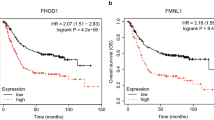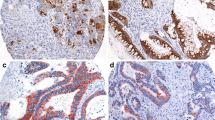Abstract
PURPOSE: The aim of this study was to evaluate the possibility of identifying biologically aggressive subgroups of patients, combining several biologic parameters such as the tumor and normal mucosa values from the ploidy, the S-phase cell percentage, and tumor-associated glycoprotein-72 (TAG-72) expression. METHODS: One hundred five colorectal cancer patients were studied to analyze the possible prognostic role of ploidy and cell kinetics in multiple fresh specimens from the tumor and normal mucosa. Since the presence of TAG-72 in the colonic mucosa has been correlated to neoplastic transformation, the correlations between these parameters and the quantitative tissue expression of the TAG-72 were analyzed in a subgroup of 53 cases. RESULTS: A significantly lower five-year disease-free survival rate (21.4 percent) was observed in patients with multiploid tumors, when compared with that observed in patients with diploid or single aneuploid tumors (67.5 percent) (P =0.03). The quantitative tissue TAG-72 expression contributed in identifying a particular patient subgroup (20 percent), characterized by S-phase percentage and TAG-72 values from the normal mucosa that were unexpectedly higher than 12.1 percent and 7.5 U/mg of proteins, respectively. In particular, when the 25 Dukes B patients were analyzed, similar results were observed. In fact, 14 (56 percent) cases showed high tumor cell proliferation and, surprisingly, a high tissue TAG-72 content in the normal mucosa was found in 4 (28.6 percent) of these patients. CONCLUSIONS: Other than multiploidy, the biologic aggressiveness of colorectal cancer might be successfully assessed introducing the evaluation of new biologic parameters, such as the TAG-72 content and S-phase percentage values of the normal mucosa, suggesting the possibility of further stratifying this patient population.
Similar content being viewed by others
References
Williams NN, Gyorfi T, Iliopoulos D,et al. Growthfactor-independence and invasive properties of colorectal carcinoma cells. Int J Cancer 1992;50:274–80.
Primus FJ, Newell KD, Blue A, Goldenberg DM. Immunological heterogeneity of carcinoembryonic antigen: antigenic determinants on carcinoembryonic antigen distinguished by monoclonal antibodies. Cancer Res 1983;43:686–92.
Kokal W, Sheibani K, Terz J, Harada JR. Tumor DNA content in the prognosis of colorectal carcinoma. JAMA 1986;255:3123–7.
Jones DJ, More M, Schofield PF. Refining the prognostic significance of DNA ploidy status in colorectal cancer: a prospective flow cytometric study. Int J Cancer 1988;41:206–10.
Russo A, Bazan V, Plaja S, Leonardi P, Bazan P. Patterns of DNA ploidy in operable colorectal carcinoma: a prospective study of 100 cases. J Surg Oncol 199;48:4–10.
Armitage NC, Ballantyne KC, Sheffield JP, Clarke P, Evans DF, Hardcastle JD. A prospective evaluation of the effect of tumor cell DNA content on recurrence in colorectal cancer. Cancer 1991;67:2599–604.
Witzig TE, Loprinzi CL, Gonchoroff NJ,et al. DNA ploidy and cell kinetic measurements as predictors of recurrence and survival in stages B2 and C colorectal carcinomas. Cancer 1991;68:879–88.
Dean PA, Vernava AM III. Flow cytometric analysis of DNA content in colorectal carcinoma. Dis Colon Rectum 1992;35:95–102.
Frankfurt OS, Arbuck SG, Greco WR,et al. Prognostic significance of DNA aneuploidy in human colorectal cancer. Proc Am Soc Clin Oncol 1984;3:17.
Rognum TO, Thorud E, Lunfd E. Survival of large bowel carcinoma patients with different DNA ploidy. Br J Cancer 1987;56:633–41.
Cusick EI, Milton JJ, Ewen SW. The resolution of aneuploid DNA stem lines by flow cytometry: limitations imposed by the coefficient of variation and the percentage of aneuploid nuclei. Anal Cell Pathol 1990;2:139–48.
Ciaretti W, Danova M, Geido S,et al. Flow cytometric DNA index in the prognosis of colorectal cancer. Cancer 1991;67:1921–7.
Hedley DW. Flow cytometry using paraffin-embedded tissue: five years on. Cytometry 1989;10:229–41.
Kalliomemi OP. Comparison of fresh and paraffinembedded tissue as starting material for DNA flow cytometry and evaluation of intratumor heterogeneity. Cytometry 1988;9:164–9.
Sikorska H, Shuster J, Gold P. Clinical applications of carcinoembryonic antigen. Cancer Detect Prev 1988;12:321–55.
Kohler G, Milstein C. Continuous cultures of fused cells secreting antibody of pre-defined specificity. Nature 1975;256:494–7.
Johnson VG, Schlom J, Paterson AJ, Bennett J, Magnani JL, Colcher D. Analysis of a human tumorassociated glycoprotein (TAG-72) identified by monoclonal antibody B72.3- Cancer Res 1986;46:850–7.
Thor A, Ohuchi N, Szpak CA, Johnston W, Schlom J. Distribution of oncofetal antigen tumor-associated glycoprotein-72 defined by monoclonal antibody B72.3. Cancer Res 1986;46:3118–24.
Guadagni F, Roselli M, Amato T,et al. Clinical evaluation of serum tumor-associated glycoprotein-72 as a novel tumor marker for colorectal cancer patients. J Surg Oncol 1991;2(Suppl):16–20.
Guadagni F, Roselli M, Amato T,et al. Tumor-associated glycoprotein-72 (TAG-72) serum levels complement carcinoembryonic antigen levels in monitoring patients with gastrointestinal carcinoma: a longitudinal study. Cancer 1991;11:2443–50.
Guadagni F, Roselli M, Ferroni P,et al. Clinical evaluation of the new tumor marker TAG-72. Anticancer Res 1991;11:1389–94.
Guadagni F, Roselli M, Cosimelli M,et al. TAG-72 (CA 72.4 assay) as a complementary serum tumor antigen to carcinoembryonic antigen in monitoring patients with colorectal cancer. Cancer 1993;72:2098–2106.
D'Agnano I, Cosimelli M, La Pera A,et al. Flow cytometric analysis of DNA content and cell kinetics in colorectal carcinoma. Anticancer Res 1993;13:699–704.
Colcher D, Horan Hand P, Teramoto Y, Wunderlich D, Schlom J. Use of monoclonal antibodies to define the diversity of mammary tumor viral gene products in virions and mammary tumors of the genus Mus. Cancer Res 1981;41:1451–9.
Kaplan EL, Meier P. Non parametric estimation from incomplete observations. J Am Stat Assoc 1958;53:457–81.
Armitage NC, Ballantyne KC, Evans DF, Clarke P, Sheffield J, Harcastle JD. The influence of tumor cell DNA content on survival in colorectal cancer: a detailed analysis. Br J Cancer 1990;62:852–6.
Harlow SP, Eriksen BL, Poggensee L,et al. Prognostic implications of proliferative activity and DNA aneuploidy in Astler Coller Dukes stage C colonic adenocarcinomas. Cancer Res 1991;51:2403–9.
Rognum TO, Lund E, Meling GI, Langmark F. Near diploid large bowel carcinomas have better five-year survival that aneuploid ones. Cancer 1991;6:1077–81.
Kouri M, Pyrhoenen S, Mecklin JP,et al. The prognostic value of DNA ploidy in colorectal carcinoma: a prospective study. Br J Cancer 1990;62:976–81.
Rognum TO, Thorud E, Lund E. Survival of large bowel carcinoma patients with different DNA ploidy. Br J Cancer 1987;56:633–6.
Finan PJ, Quirke P, Dixon JE, Giles GR, Bird CC. Is DNA aneuploidy a good prognostic indicator in patients with advanced colorectal cancer? Br J Cancer 1986;54:327–30.
Silvestrini R, D'Agnano I, Faranda A,et al. Flow cytometric analysis of ploidy in colorectal cancer: a multicentric experience. Br J Cancer 1993;67:1042–6.
Jass JR, Mukawa K, Goh HS, Love SB, Capellaro D. Clinical importance of DNA content in rectal cancer measured by flow cytometry. J Clin Pathol 1989;42:254–9.
Meyer JS, Priolean PG. S phase fractions of colorectal carcinomas related to pathologic and clinical features. Cancer 1981;48:1221–9.
Quirke P, Dixon MF, Clayden AD. Prognostic significance of DNA aneuploidy and cell proliferation in rectal adenocarcinomas. J Pathol 1987;151:275–91.
Scott N, Cross D, Plumb MI, Dixon MF, Quirke P. An investigation of different methods of cell cycle analysis by flow cytometry in rectal cancer. Br J Cancer 1992;65:8–10.
Wolf RC, D'Emilia JC, Salem RR,et al. Detection of the tumor associated glycoprotein antigen (TAG-72) in premalignant lesions of the colon. J Natl Cancer Inst 1989;81:1913–7.
Xu M, Real FX, Welt S, Schussler MH, Oettgen HF, Old LJ. Expression of TAG-72 in normal colon, transitional mucosa, and colon cancer. Int J Cancer 1989;44:985–9.
Witzig TE, Loprinzi CL, Gonchoroff NJ,et al. DNA ploidy and cell kinetic measurements as predictors of recurrence and survival in stages B2 and C colorectal adenocarcinoma. Cancer 1991;68:879–88.
Author information
Authors and Affiliations
Additional information
This study was supported in part by the CNR Project ACRO Grant 9202305PF39 and by the AIRC.
About this article
Cite this article
Cavaliere, F., Guadagni, F., D'Agnano, I. et al. Biologic and clinical correlations among ploidy, cell kinetics, and the tumor-associated glycoprotein-72 tissue expression in colorectal cancer. Dis Colon Rectum 37 (Suppl 2), S24–S29 (1994). https://doi.org/10.1007/BF02048427
Issue Date:
DOI: https://doi.org/10.1007/BF02048427




